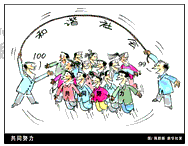A conventional teacher’s licensee usually requires a university degree in education plus an unpaid term of practice teaching. This has never made much sense. It excludes bright students who take degrees in other subjects, and might teach those subjects; it is costly and time-consuming for career-switchers, who must wait a year or more before they can enter a classroom; it is so rigid that private-school teachers or university professors with years of experience have to jump through hoops before they can start teaching in a state school. And there is virtually no evidence that it creates better teachers. For all that, it is ply backed by schools of education, which have a monopoly of teacher-training, and by teachers’ unions, whose members make more money when it is artificially hard for others to get into the profession.
Now, some 45 states and the Districts of Columbia offer an "alternative route" to a teacher’s licensee, up from only a handful in the 1980s. Alternative certification (AC) generally allows individuals with a university degree to begin teaching immediately after passing an entrance examination. These recruits, watched over by a mentor teach the subject they studied at university, and take education courses at a sponsoring university while drawing their salaries.
The traditional sort of American teacher is likely to be young, white and female. Alternative certification attracts more men and more non-whites. In Texas, for instance, roughly 90% of public-school teachers are white, but 40% of those who have joined through alternative certification are non-whites. The AC route also draws teachers willing to go where they are most needed. A survey of Troops to Teachers, a program that turns exsoldiers into public-school teachers (" Proud to serve again"), found that 39% of those taking part are willing to teach in inner-city schools, and 68% in rural areas.
Are they good teachers Officialdom is reluctant to release the details which might answer that question for certain. But anecdotal evidence suggests they do well. In New Jersey, which has been running this sort of program since 1984, rich districts, which can afford to be choosy, consistently hire more AC teachers than poor districts do. In Houston, Texas, where the Teach of America program (TFA) puts recent university graduates into poor communities as teachers, the most effective teachers are generally the TFA ones. " School principals are our biggest fans," Wendy Kopp, TFA’s president, says proudly.
So why not scrap the cumbersome teacher-licensing laws Frederick Hess, a professor at the University of Virginia, has written a paper for the Progressive Policy Institute arguing that teacher-licensing ought to be stripped to the bare essentials. Prospective teachers should be required only to hold a college degree, pass a test of essential skills, and be checked to make sure they do not have a criminal background. Other training is important, argues Mr. Hess, but the market, not state legislators, should decide what that training looks like. This notion of "competitive certification" has drawn favorable attention from the Bush administration.
What does the author suggest when he calls for "competitive certification" ( Line 7—8, Para.5 )()
A. Simplify teacher-licencing
B. Operate education like a market
C. Scrap unified education standard
D. Make entry easy for prospective teachers
参考答案:A
解析:
[考核题型] 作者观点题
答案在文章最后一段。文章首段批评了传统的教师资格证书体制过于繁琐,带来种种弊端;第二至四段则介绍了新的教师资格认证办法及其带来的积极变化;最后一段作者提出自己的主张。从最后一段的主题句看,作者的主张是废除繁琐的教师资格认证法。接着作者引用了弗吉尼亚大学汉斯教授的观点来说明如何简化入行(进入教师行业)程序,并提到了the notion of competitive ceritfication,说它已经引起了布什政府的积极关注。(This notion of competitive certification”has draWn favourable attention from the Bush administration.)所以,作者在呼吁“competitilye certification(资格竞争)”时,实际上主张的是简化教师资格认证程序和内容。因此A项为正确答案。B项是干扰项。最后一段倒数第2句话汉斯认为教师从前所接受的培训内容应该由市场而不是立法者决定。B项则把training偷换为education,违背了原文。C项明显不符合原文。D项不如A项直接准确。

